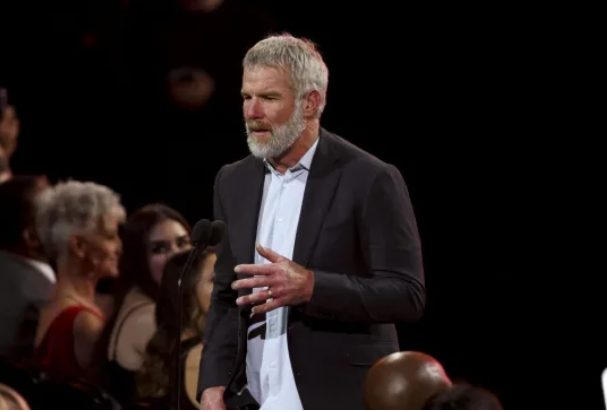Although his defamation case against Pat McAfee recently ended in a settlement, Brett Favre’s defamation case against another former NFL player turned broadcaster—Shannon Sharpe—continues in a Mississippi federal court.
Last week, Favre filed a 32-page memorandum of law in opposition to Sharpe’s motion to dismiss. Favre insists that Sharpe’s commentary about his relationship to a scheme in which $77 million was misappropriated from a Mississippi welfare program crossed the line from sports talk banter to statements of fact that were both untrue and reputationally harmful.
Favre hasn’t been charged with a crime, and there’s no indication he’ll face charges. However, the former NFL quarterback is a defendant in a civil lawsuit brought by the Mississippi Department of Human Service, which depicts Favre as conspiring with others to misuse governmental funds for volleyball and football facilities projects at the University of Southern Mississippi. Favre has also returned money for speeches he never gave.
Sharpe, whose brother Sterling Sharpe was a teammate of Favre’s on the Green Bay Packers in the 1990s, is a co-host with Skip Bayless on FS1’s Skip and Shannon: Undisputed. While on the show last September, Sharpe said:
· “Brett Favre is taking from the underserved.”
· “[Favre] stole money from people that really needed that money.”
· “The problem that I have with this situation, is you’ve got to be a sorry mofo to steal from the lowest of the low.”
Favre argues these statements are defamatory in that they suggest Favre committed larceny and possibly other crimes. These statements also, allegedly, imply Favre is in the same legal predicament as others in the scandal who (unlike Favre) were criminally charged.
Favre faces hurdles in proving that Sharpe committed defamation. One is that Favre is a public figure, which adds the legal requirement of proving actual malice. Favre must show Sharpe not only made false and hurtful statements but did so with the knowledge that the statements were false or with reckless disregard as to whether they were true or false.
Another hurdle is that defamation involves untrue statements presented as factual or objective remarks. Sharpe’s remarks are arguably a combination of opinion, hyperbole, and exaggeration (i.e., not grounds for defamation) consistent with the banter one might hear on a popular sports talk show.
Sharpe’s case also relies on the government’s accusation that Favre broke the law (civil law, but the law nevertheless), which could mean the statements were arguably not untrue or not knowingly untrue.
Moreover, Sharpe’s court filings note that he relied on media accounts of Favre’s role, including Favre suspiciously texting the head of a nonprofit who later pleaded guilty to fraud, “If you were to pay me, is there any way the media can find out where it came from and how much?” and a Yahoo! story that reported the FBI questioned Favre as part of the larger investigation.
But Favre maintains that even if Sharpe’s comments were shaped by the civil suit and the unflattering media coverage, and even if Sharpe was performing on a cable sports debate show where hosts are supposed to stir the pot, none of that gives him a “license to defame.”
Favre distinguishes the legal contours of Sharpe’s statements from those made by MSNBC host Rachel Maddow and former Fox News host Tucker Carlson to bolster that assertion.
Maddow was sued for defamation after she described One American News Network (OAN) as “the most obsequiously pro-Trump right-wing news outlet in America really literally is paid Russian propaganda” and an OAN employee as “being paid by the Russian government to produce government-funded pro-Putin propaganda for a Russian government-funded propaganda outfit called Sputnik.”
Maddow defeated the lawsuit, with a district court and the Ninth Circuit finding that Maddow’s audience knows she relies on “subjective language that comports with her political opinions” and expects her to sometimes use “fiery rhetoric or hyperbole.” Favre argues Maddow’s situation was different given that Maddow repeatedly stated her opinions and political views on her show whereas (in his view) Sharpe didn’t present his viewers with a comparable context.
Favre also contrasts Sharpe with Carlson. Former Playboy magazine model Karen McDougal sued Fox News after Carlson commented on alleged payments to keep her supposed relationship with former President Donald Trump quiet. “Remember the facts of the story,” Carlson said. “These are undisputed. Two women approached Donald Trump and threatened to ruin his career and humiliate his family if he doesn’t give them money. Now, that sounds like a classic case of extortion.”
The court dismissed McDougal’s lawsuit, finding that Carlson was merely engaging in a routine performance involving “rhetorical hyperbole and opinion commentary intended to frame a political debate,” and he was relying on what other media reported. Favre argues that Sharpe’s remarks were not made as part of an analogous routine performance and that Sharpe enlarged Favre’s controversy to accuse him of a criminal act.
It’s possible Favre’s lawsuit with Sharpe could settle along the lines of the settlement for McAfee’s. McAfee told his viewers he was sorry for a misunderstanding and that his remarks were “expressed in comedic style” and “based solely on public information and allegations.” McAfee reportedly paid no amount to Favre, who seemed to most want an on-air statement of clarification from McAfee.
If Favre v. Sharpe doesn’t settle, the case could make for an interesting precedent regarding how sports-TV commentators discuss legal controversies.







